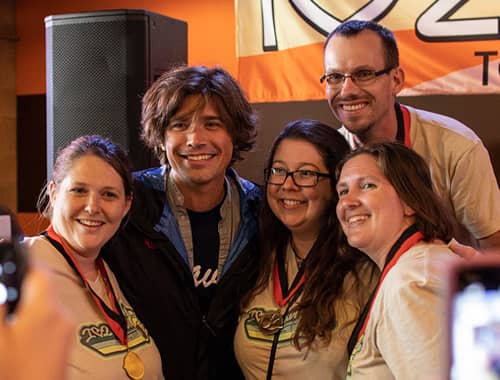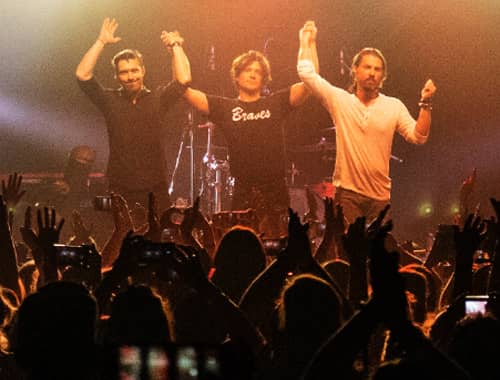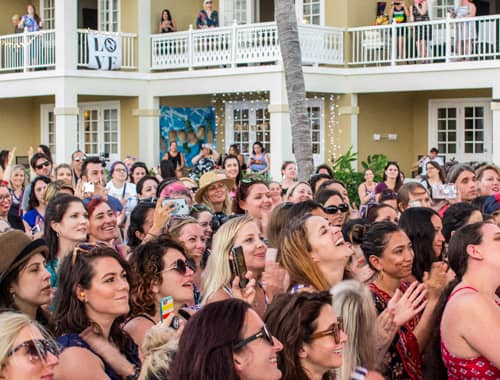ModernDrummer.com
Oct 26, 2004 |
Now nineteen and the CEO of the band’s label, 3CG, Zac speaks to MD online about what it’s like for him eight years later. The brothers’ latest CD is Underneath, and, unlike it predecessor, it lists only Zac behind the kit.
A few years ago I saw Zac perform live. Speaking with him shortly after, I found him to be very serious about his playing and his music. So it came as no surprise that on Underneath Zac sounds as solid as a seasoned session drummer. The band is currently on a national tour; we caught up with the drummer in Las Vegas.
MD: You’re credited as the only drummer playing on your new album.
Zac: Yes. Luis Conte played percussion. He drips rhythm. It’s like he walks in and everybody suddenly gets a backbeat just because he’s there. [laughs] I was holding the same shaker Luis was, but for some reason it sounded thirty times better when he played it. And how he got that little triplet in there that he adds—that flick of the wrist or movement of a finger….
MD: Prior to that, did you play on your first two records?
Zac: I didn’t play that much on our first record, but I did play on most of the second one, This Time Around. I was an eleven-year-old who was playing for three years at that point. I’m sure you know that Abe Laboriel Jr. played on some tracks.
MD: Were you in the studio when Abe cut those tracks?
Zac: Yes. I was the one who asked him to come in, because I’m such a fan of his drumming. I felt, “You know what? I’m not going to do as good a job on this song.†Abe is so talented as a drummer, and his feel…he knows how to play music while drumming. He knows how not to play, yet he can play anything.
One of my favorite moments was just sitting down with him, with two drumsets, just playing and talking shop for a while. I don’t consider myself a drummer’s drummer. I’ve never wanted to be the guy who could play the most notes, I just wanted to be Ringo Starr, a guy who adds great parts to the songs. I don’t know if I’ve done it yet, but that’s what I strive to do. Abe is a great example of a drummer who can play with such a solid backbeat and still be musical and throw in a trill or whatever when he needs to—without overplaying. That’s always the key. It’s like some drummers get so good, they don’t know how to play stupid any more.
MD: Explain what you mean by “playing stupid.â€
Zac: I just mean playing simple beats. Look at the great drummers who play on records. They’re the ones who can play the simple beats, perfectly. You don’t get paid more for more notes.
MD: What did you learn from Abe?
Zac: I learned from just listening to his drumming. On our second record the songs that he did play on, I had to re-create live. So when I went back and listened to what he’d done, I incorporated his ideas into my playing.
MD: Let’s go back to the beginning. Who and what made you want to play drums?
Zac: I guess it sort of came naturally to me. I always had an affinity for banging on stuff. I’ve always been the more secluded brother, so sitting at the back of the stage and going about my business made sense to me as a person. And then once I started playing drums, it was just something that naturally fit well. And I really enjoyed it once I started doing it—there’s no stopping once you start.
MD: Did you then take formal lessons?
Zac: I took drum lessons for about a month, mostly from a teacher in town who was a rock drummer in a local band. He started me off with some basic beats. I didn’t start by doing paradiddles and rudiments, I started off only playing beats.
MD: Do you think that that’s what made you think more musically in your playing?
Zac: Definitely! I’m very thankful that I started off that way, because I think it put the right idea in my head about where I’m supposed to be as a drummer—where drums should sit in a piece of music, my piece of the puzzle.
MD: So, next thing you know you is, you’re eleven years old and an overnight superstar. The pressure had to be tremendous.
Zac: So many people think they know who you are and what you’re supposed to be. I think we’re all very lucky to be three guys instead of one—and especially to be brothers. There was no disconnect. I’ve heard producers and songwriters we’ve worked with say, “You know, those guys are sometimes hard to work with because they all agree on everything.†[laughs] We have a very common vision for where we are as a band and where we’re going. Though, we’re all songwriters, and we’re all writing songs separately with different people, and we come out with three completely different styles. But when we come together we have a very strong vision for where we’re going.
I don’t think there’s anything worse than not growing as a songwriter. Music is a constantly evolving thing, because it’s a representation of a human being. Whatever it’s about, it’s got to feel natural, it’s got to feel honest. I find music is really there to help people express emotions that they can’t express themselves.
MD: Going back to the drums, on the new record, how did you cut the tracks? Was it heavily ProTooled?
Zac: No, definitely not. There were even a couple tracks cut live, like “Underneath.†“When You’re Gone†was cut mostly live.
It’s unfortunate, but a lot of music is ProTooled to death. They’ve defined exact tempos of where songs should be. But that’s not necessarily the only way it should be. The click should just be a guide. Sometimes speeding up in a section makes it feel better. The song “This Time Around,†on our last record, speeds up in the choruses—I think it’s like three bpm or so—because it needed that feeling, And that’s natural. It’s just about getting the emotion, even on drums. After that it doesn’t matter if you speed up or slow down slightly. But if you are playing it with conviction, then everyone will be ready to follow you.
MD: Are you into tuning your own drums?
Zac: I do that more as I build my skills as a drummer. On some songs my drums are tuned by guys like the Drum Doctor, Ross Garfield. We rented a few of his kits.
MD: Did you use different kits on this record?
Zac: For about half the record I used a solid-wood Ayotte kit. On the other half I used a set of DWs. The snare was a Ludwig Black Beauty. Ayotte has got the wood rims on all their drums, and it’s just a really natural wood feeling and sound. We dampened them up a bunch with paper towels and whatever else we could find, to get that really dead ’70s-type drum sound. When it’s appropriate that’s one of my favorite sounds. There’s just something really cool about drums that go boomf. It’s understated.
MD: Cymbals?
Zac: Zildjian. Mostly Z series rock cymbals.
MD: Sticks?
Zac: I don’t have an endorsement with anyone right now. I used Johnny Rabb for years, which I loved! Then they went out of business. So, right now I’m sort of searching. There’s a guy who is making carbon fiber sticks, and they’re pretty cool. The main advantage is for touring—the carbon fiber take so long to break. I’ve been playing with the same pair for five shows now.
MD: Do you use electronics?
Zac: I don’t really like them. There’s too much spring. I feel like I’m playing on a trampoline. There’s nothing like the way real drums feel and sound.
MD: Do you practice?
Zac: I try to. For the last year or so we’ve been on the road so much. We did an acoustic tour last year all across the country. And even in that acoustic setting I was still playing quite a bit of hand drumm



